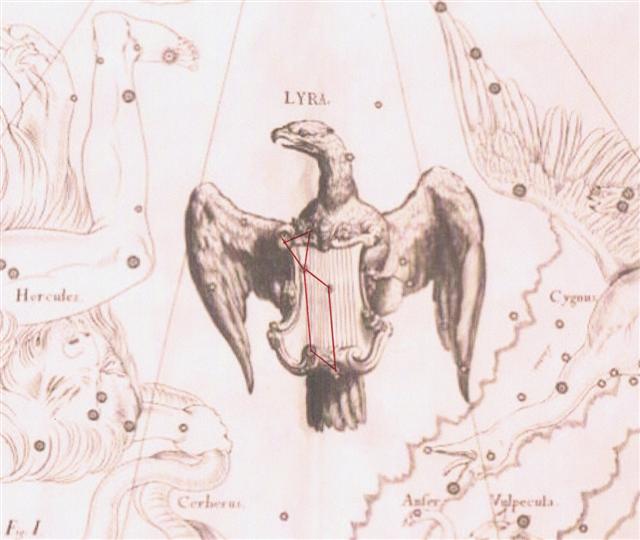3. The first stars of Lyra (κ and μ) could have functioned as announcers of the coming great star Vega. Excepting Arcturus it is the brightest star in the northern hemisphere:
The Gregorian calendar has winter solstice (north of the equator) a week before the right ascension time of Vega. According to my reconstructed calendar for the era when Aldebaran and Antares defined the pair of 'years' (the year in leaf respectively the year in straw) day 295 was the time of κ Lyrae. 4 nights later came Vega. There are 10 'feathers' on the back side of the head down creature in Ga8-16 and October 27 is day 300. "μ, of the 5th magnitude, was Kazwini's Al Athfār, the Talons (of the Falling Eagle), which he described as a fainter star in front of the bright one, i.e. west of Wega." (Allen) The Falling Eagle should have its face looking backwards (towards the past because he has no future), and such is the case in Hevelius:
 There is only one manu rere looking to the past in the G text. In Cor Serpentis I suggested we should count ahead from Gb2-10, from its assumed date 'July 6, to Vega and 'December 28 (or possibly 'December 31):
The end of the back side of the G tablet could perhaps have been used to project a description of the end of the Gregorian calendar. Hua (the 'fruit') in Gb8-3 has 5 + 5 = 10 feathers and would then have a position corresponding to that of the head down creature in Ga8-16. On the other hand, there seems to be a juvenile manu rere looking ahead in Ga8-20 and an old one looking back in Gb8-5.
From the midnight culmination of Vega in 'August 12 (day 224) to its right ascension in 'December 28 (362) there were approximately 362 - 224 = 138 nights. From its right ascension day to its midnight culmination there were ca 365 - 138 = 227 nights. 447 (at Gb8-5) - 219 (at Ga8-15) = 228, which is close enough I think:
There are 3 nights from December 28 to the end of the year and there are 3 glyphs from Gb8-2 to the reversed manu rere. Perhaps glyph 444 had a special importance, motivating a location in the text which was 225 (= 15 * 15) positions ahead of Ga8-15 (maybe partially because 444 = 80 + 364). If Ga8-19 represents 'January 1, then there could be 224 nights to the reversed manu rere, i.e. its date could be 'August 12 (the culmination date of Vega). | ||||||||||||||||||||||||||||||||||||||||||||||||||||||||||||||||||||||||||||||||||||||||||||||||||||||||||||||||||||||||||||||||||||












